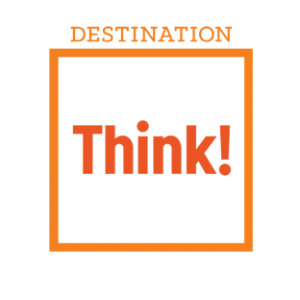Category
tourism bc
-
personal, social media, tourism bc, Travel & Tourism
Leaving Tourism BC, joining Think!
10.15.10 | Permalink | 15 CommentsMy passion is to bring innovative marketing to the tourism industry so that travelers are happy and operators benefit.
The world has changed. Social media, online marketing and technology continues to disrupt traditional marketing methods and success will be defined by understanding new emerging principles, creating sound strategies with a nimble execution of tactics.
We need to bring 21st century marketing to the tourism industry. From the smallest operator to the largest DMO. I love sharing what I know and also learn from others. I want to do more of it.
So after 11 great years at Tourism British Columbia I’ve decided it is time for a change. Effective November 12, I will be joining the team at Think! Social Media. Rodney and Ben have built an impressive team of brilliant people who bring smart marketing to an exciting and growing list of clients in the travel and tourism industry.
Think! has a different approach. We live the principles of social media. The result is some impressive work and strong client relationships. Clients are now asking to build out the services beyond social media. We will do this while staying true to our values.
I’m sad to leave the organization who have given me so many great opportunities and especially the incredibly talented people I work with every day, around the world. People at Tourism BC, but also at our partners. I’m going to miss them a lot. But in a networked world, we’re only one tweet or status update away.
-
Internet, Marketing, tourism bc, Travel & Tourism
New on HelloBC.com: interactive driving routes
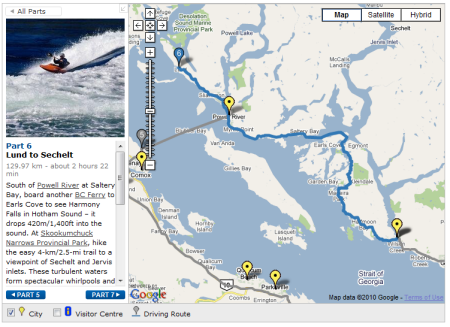
A few weeks ago we launched new functionality on HelloBC.com and it’s probably the best work we’ve done to date.
BC is a large and diverse province and in order to fully experience it you need some wheels. To make planning a driving vacation easier, we added new functionality to enhance our driving routes content and make it easier to plan a trip.
This new section takes full advantage of Google Maps, includes detailed maps, driving routes and information about cities and towns you pass through. The location of our Visitor Centres are also present. Long routes, like the Heritage Discovery Circle Tour (3,498 km) are divided into manageable parts. You’ll read about highlights, what you can expect and see photos of the scenery you’ll find along the way.
Go check out our new driving routes. We’re already working on Phase 2 to make the experience even better.
Thank you Holly, Patrick, Tammy, Sarah, Karen, Mikala, Rob, Ana, Galina and everybody else who made this happen.
-
Management, Marketing, tourism bc
Tourism BC 2010 Online Olympics activities: #12 – Battlestar Olympia
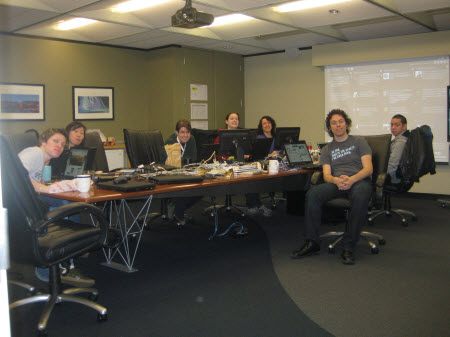
Tourism BC’s online team: Sarah, Jeanine, Holly, Karen, Mikala, William, Jose (on a PPC mission at the time: Dima)The traffic on our websites during the games was significant enough to have a day-to-day look at our tactics and adjust where necesary. What’s media talking about? What are people talking about in social media? Is there a cool story we can leverage through content? Is there something unexpected? Should we send a Field Reporter? Do we make adjustments to our PPC campaigns? Daily huddles and conference calls with our online partners allow us to quickly change plans.
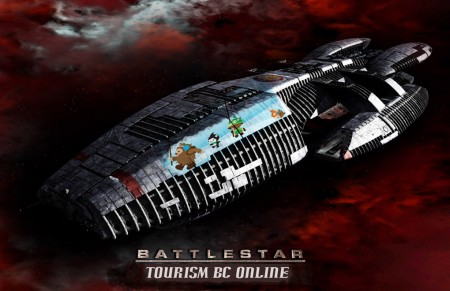
We turned one of our boardrooms into a command centre for the occassion: the Battlestar. Watching the games on a big screen and real time Tweets. Because we’re geeks after all.
This is also my opportunity to thank everybody on the online team, other Tourism BC teams and our partners who were instrumental in making the best use of this Olympic opportunity!
-
Internet, Marketing, tourism bc
Tourism BC 2010 Online Olympics activities: #11 – Social Media
An event like the Olympics makes all media, including social media, light up like a Christmas Tree. Everybody’s talking about it, and that’s exactly what we want. Instead of adding to the noise, our strategy for social media during the games focussed on supporting and encouraging key influencers while leveraging our own network.
Listening
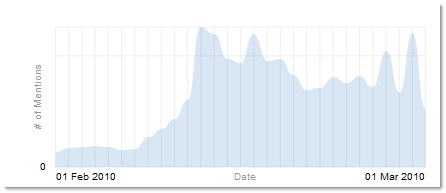
Tourism in BC related social media volume during February
Social media is the largest focus group out there so we treat it as a huge research opportunity. Data has been collected and will be analyzed. We’ve also used our monitoring tools to provide insights to our media, SEM Field Reporters and content teams. This enabled us to quickly respond to unexpected stories.
After the games, we can look at the data to identify what resonated about Vancouver and BC as a destination, potential new markets or product opportunities and key influencers in social media for future engagement.
Assisting and encouraging key influencers
Working with key influencers is a lot like working with travel media professionals (with a twist) especially since many traditional travel media have their own blogs. But there are also pure social media influencers, including local bloggers, athlete tweeters, etc. Jose from our online team has been working closely with our Travel Media team to coordinate efforts.
Building our community

We used the pre-Olympics to experiment with running contests on Twitter. We managed to more than triple our number of followers by giving away some Olympic tickets. We were wondering if people would leave right after, but they didn’t and instead are engaging with Karen, our tweeter extraordinaire, and re-tweeting our messages to their networks.
As an added bonus, our contest winners have been tweeting and blogging about their experiences and traveled around with our Field Reporters.
Engaging our community

Facebook fans and Twitter followers are a diverse group of BC residents, past visitors, tourism industry stakeholders and people who would like to visit. During the games, we tweeted information about the games, general trip ideas based on what was being talked about and re-tweeted messages from others. URLS’s were being tracked and during the games period, drove almost 50,000 visitors to our website.
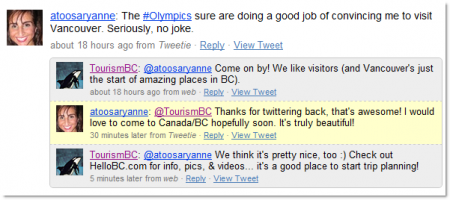
Karen set up searches in Tweetdeck to filter people who expressed an interest in visiting and started the conversation to make the trip a reality leading to wonderful conversations, new followers and hopefully visitors soon.
Lifepoints campaign
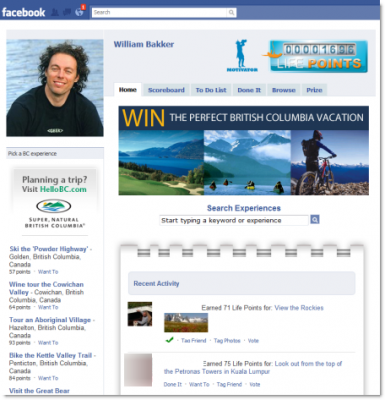
Lifepoints is a Facebook application where you get points for your life experiences. Points are based on how people have rated each experience. Compete with your friends for who gets the most out of life and create your own bucketlist by ‘wanting’ things. A natural fit with tourism so we’re running a campaign with Lifepoints to highlight some of the great experiences British Columbia has to offer and promote our contest.
Field Reporters
And of course we wanted to capture the excitement of the games through our Field Reporters. They’ve been all over town, and the rest of the province, to capture the Olympic vibe, the reactions from spectators, athletes and celebrities, against the backdrop of the destination. -
Internet, Marketing, tourism bc
Tourism BC 2010 Online Olympics activities: #10 – Content is King
02.25.10 | Permalink | 2 CommentsWhen somebody is interested and inspired in British Columbia as a result of the games, we’d like to the person to start the planning process. And in the planning process, content is King, and details matter.
Over the last few years, our product management and content teams have done an incredible job of turning HelloBC.com into an in-depth travel planning resource. HelloBC contains information for over 100 different activity categories in 6 regions. But that wasn’t enough. Our website users told us they need more information at the community level in order to make the decision to visit.

The 139 communities with in-depth content
Over the last 18 months, our content team, lead by our content Queen Mikala (also part-time indie rock groupie guru) has completed a monumental task by creating in-depth information for 139 communities across the province before the start of the games. In strong collaboration with of our regional and community partners, our writers visited 139 communities across the province, meeting with local stakeholders, touring the community and creating in depth information for HelloBC.com.
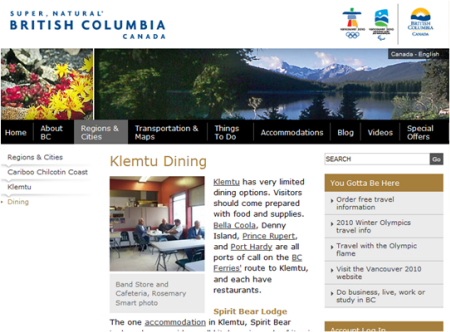
Long tail content: dining in Klemtu
The result is unprecedented. Thousands of pages of content; whether you’re interested in Cat-Skiing near Kaslo, Kermode Bear-Watching in Klemtu, mining tours in Trail, Aboriginal & Cultural experiences in Kamloops or visiting farms & Orchards near Harrison Hot Springs, the information is all there on HelloBC.
Anybody interested in BC as a result of the games will have all the information to create their BC vacation.
-
Internet, Marketing, tourism bc
Tourism BC 2010 Online Olympics activities: #8 – grow our consumer database
We want to mitigate the risk that when the games are over, we’ll be out of sight, out of mind. All activities are geared towards making sure the impression we make is a big one and over the last few days I’ve shared our strategies to maximize the destination awareness and get people to start thinking about a possible visit by visiting our consumer websites.
Part of our post-games strategy is to be pro-active when the games are over and we’re putting a lot of energy into growing our consumer database. That way, we don’t have to rely on people remembering BC is great, but we can pro-actively tap them on the shoulder and remind them. Our database marketing program has evolved into sophisticated event based communication, customized to individual consumer profiles. The more consumers we can add to the database, the better guarantee for success.
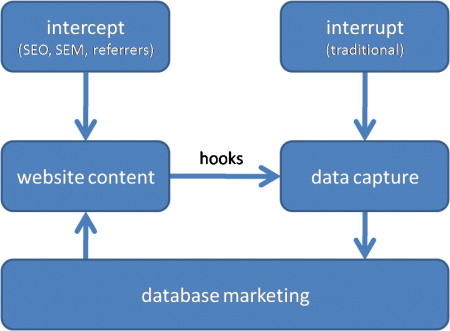
The chart above show our model for our typical approach to driving website visitation and data capture (growing our consumer database).
Intercept
Intercept tactics are targeting consumers who are specifically looking for information we provide. And in previous posts I already described some of the main activities we’re engaged in during the games; SEO/SEM and referral links. These tactics are proven to be very effective at driving highly qualified visitors.
Interrupt
Interrupt tactics are more traditional and includes things like online display advertising. These tactics aren’t necessarily targeting people who are looking for our information but target the people who fit our target audience. They might be looking for something else like medal standings and the purpose of the advertising is to get them interested in our message.
That’s why we use very direct and strong call-to-actions. In the case of the Olympics, a contest to win a trip to BC. We’ve learned that interrupt tactics aren’t the most effective at driving website visitation, but very effective at growing our consumer database (data capture).
Hooks
Intercept tactics drive a lot of qualified visitors to our website. We try to grow our consumer database by leveraging these visitors through hooks. Hooks are tactics on the website with the purpose of growing our consumer database (data capture). We run contests, offer free brochures, maps, eNewletters and more. It’s like fishing in your own pond by adding value to the consumer.
Putting it all together
We use the model above to make investment decisions. For example (note: completely fictional numbers): if it costs $25 to get add a consumer to our database through an interrupt tactic, and we add 1% of our website visitors to our database, a cost per click of $0.25 through a PPC campaign would achieve the same results from a data capture perspective. Plus we’d get 100 qualified people on the website.
Finding the right balance between all objective leads to the right investment strategy.
-
Internet, Marketing, tourism bc
Tourism BC 2010 Online Olympics activities #7: online advertising
02.20.10 | Permalink | 3 CommentsTo maximize the games, there’s a role for advertising as well. A TV commercial was produced to build the destination brand and also serves as the call to action for people watching the games and make sure consumers know where to go for more info and start the trip planning process. Consumers in the US and Canada are encouraged to visit HelloBC.com with the help of BC born celebrities (more about the commercial here).
The purpose of our online ads is not to just get people on our website, but do something very specific; grow our consumer database. The ads have a contest as a call-to-action where they can win a trip to BC this summer.

Tomorrow: our full strategy to leverage the games to grow our consumer database
-
Internet, Marketing, tourism bc
Tourism BC 2010 Online Olympics activities: #6 – SEO & SEM
02.19.10 | Permalink | 2 CommentsSearch Engines have been our biggest source of website visitation for years now. Search Engine Optimization and Marketing is also a long tail strategy. In 2009, over 500,000 unique queries drove visitors to HelloBC.com, accounting for 80% of visitors in 2009.
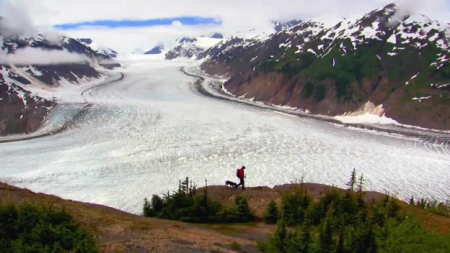
Still from the NBC’s opening ceremonies pre-showPeople watch TV with a computer close by. All it takes is that one beautiful shot to make somebody interested in British Columbia. And the obvious place to go when you see something and want to learn more is a Search Engine.

Search volume for the keywords ‘beijing travel’ during the 2008 gamesThe chart from Google Insights for Search above shows the increase in search volume for the keywords Beijing travel. It demonstrates the games generates increased interest in a destination and consumer behaviour on search engines. Taking advantage of this search activity to move consumers closer to a trip to BC has been one of our top priorities in our Olympic strategy.
Organic Search
We’ve been working on improving organic search traffic for a number of years and the results have paid off. Good content covering everything BC has to offer (more about in a laster post), combined with the right technical implementation has resulted in 60% increase of organic search visitors this year alone. Chances are high that something peaks somebody’s interest during the games, the organic search results will point to HelloBC.
And so far organic search has spiked significantly during the games, with daily organic search visitors more than doubling the highest organic search day last year.
Paid Search
To compliment our organic traffic, we run pay-per-click campaigns on the major search engines. A strategy was developed with our SEM agency Enquiro in Kelowna with the help from all three main search engines. PPC campaigns allow us to fill in gaps in our SEO efforts and target Olympic related keywords that meet our KPI’s in priority markets.
We maximize our large set of ad-groups containing our regular destination related keywords.Somebody who’s interested in anything BC related as a result of the games will be intercepted with one of our regular ads.
During the games, we compliment these adgroups with specific Olympic related adgroups. Those are keywords that relate directly to the games but people still might use to learn more about the destination. We’ve used the months prior to the games to fine tune our campaigns and find Olympic related keywords that meet our KPI’s. And even during the games, we monitor things closely, adjusting our campaigns on a daily basis to find the gems in Olympic searches.
-
Internet, Marketing, tourism bc
Tourism BC 2010 Online Olympics activities: #5 – referral traffic
I described how we maximize exposure on Olympic related website. The next step is to drive people to our consumer website HelloBC.com where they can start planning their trip. The following chart is a conceptual diagram of our approach for driving traffic from these websites through referral links.
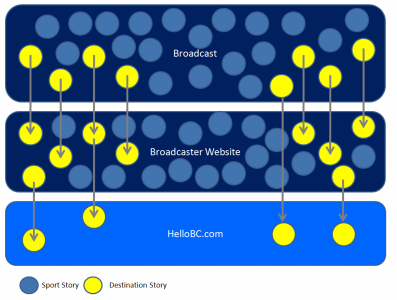
The Olympics are about stories. Stories related to athletes, the events and yes the host destination. The circles on the diagram represent these stories. Most are related to the sporting events and athletes (blue). But some are related to the host destination (yellow). These stories can send somebody down the path that will lead to visiting British Columbia.
We try to carry the destination stories through. Many broadcasters will run host destination vignettes on their TV broadcast. These stories are usually also posted on their website and media will often refer to their website for more info. And since the web doesn’t have a finite amount of space, there are more stories posted on websites. By offering ideas and support, most broadcasters have agreed to post links to HelloBC or one of our tourism partner websites to allow visitors to have access to even further depth, allowing us to continue the consumer buying process and get her one step closer to visiting BC.
The strategy is working so far. Visitors from referring sites have increased more than tenfold compared to peak traffic in the summer.

-
Internet, Marketing, tourism bc
Tourism BC 2010 Olympics online activities: #4 – drive to web strategy
Billions of people watch the games on TV. And the games are the biggest commerical a destination can wish for. Because besides the stories about sports and athletes, the destination plays a lead part.

TV viewing has changed. People watch TV together even if they’re not in the same location using laptops and phones. Research conducted almost 3 years ago during the NBC finals shows that people multitask while watching sports.
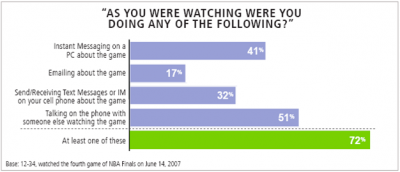
It’s one thing to read research about people texting, IM-ing, tweeting and posting on Facebook. But when I came home one night and I saw my wife Sheri watching Americ’s next top model, while texting her friend and chatting with her sister on Facebook it became real to me.
People also watch TV online. During the Beijing games, 52 million people in the US watched a video stream on NBCOlympics.com. In Europe and China even more people streamed the games online.
The point us that it’s easy for somebody to research something that catches their attention on TV. When somebody is intrigued by the destination story, a laptop or other mobile device is close by. That means a big opportunity for us to follow through on the initial awareness created through the games and encourage consumers to start the trip planning process.
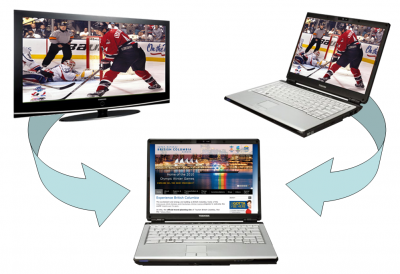
Our strategy to drive people to our consumer websites during the games involves using refering links from high traffic Olympic related websites, Search Engine Otimization and Marketing, advertising and social media. I’ll highlight each one in the next few days.


